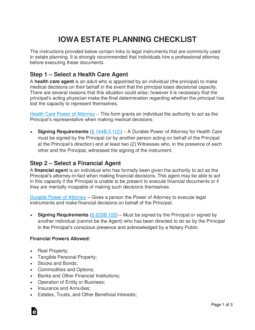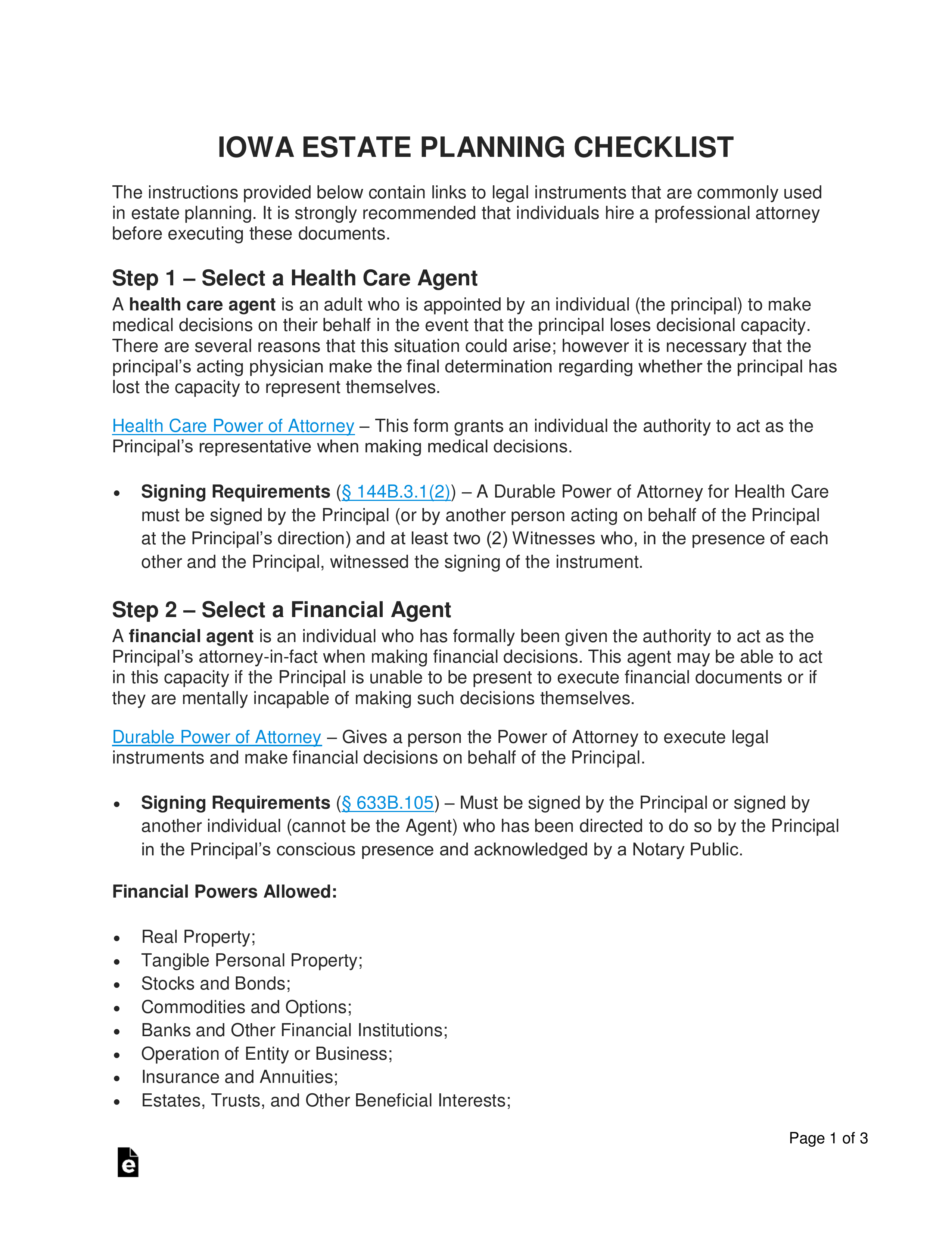Updated March 05, 2024
An Iowa estate planning checklist ensures that a person has made all of the necessary preparations to manage their estate and medical care in the future. While the Last Will and Testament is most commonly used to relay instructions for the distribution of an individual’s estate, the Revocable Living Trust is another option which allows the estate to be passed on to the individual’s beneficiaries without probate (the court process by which a will is “proved” and administered). In addition to planning for the management of an individual’s estate after they die, it is also important to put legal instruments in place that will appoint representatives to carry out an individual’s wishes and intentions if they become mentally incompetent or otherwise incapable of making important decisions and representing themselves in legal matters. This type of situation may arise due to an accident, medical emergency, or simply geographical distance (for making financial decisions). The Health Care Power of Attorney and Durable Power of Attorney forms may be employed to appoint representatives to make decisions regarding medical treatment and finances, respectively, on behalf of an individual.
How to Create an Estate Plan in Iowa (6 steps)
- Select a Health Care Agent
- Select a Financial Agent
- Make a List of All Estate Items
- Designate Beneficiaries
- Decide How to Transfer the Estate
- Keep the Documents Safe
The instructions provided below contain links to legal instruments that are commonly used in estate planning. It is strongly recommended that individuals hire a professional attorney before executing these documents.
1. Select a Health Care Agent
A health care agent is an adult who is appointed by an individual (the principal) to make medical decisions on their behalf in the event that the principal loses decisional capacity. There are several reasons that this situation could arise; however it is necessary that the principal’s acting physician make the final determination regarding whether the principal has lost the capacity to represent themselves.
Health Care Power of Attorney – This form grants an individual the authority to act as the Principal’s representative when making medical decisions.
- Signing Requirements – A Durable Power of Attorney for Health Care must be signed by the Principal (or by another person acting on behalf of the Principal at the Principal’s direction) and at least two (2) Witnesses who, in the presence of each other and the Principal, witnessed the signing of the instrument.[1]
2. Select a Financial Agent
A financial agent is an individual who has formally been given the authority to act as the Principal’s attorney-in-fact when making financial decisions. This agent may be able to act in this capacity if the Principal is unable to be present to execute financial documents or if they are mentally incapable of making such decisions themselves.
Durable Power of Attorney – Gives a person the Power of Attorney to execute legal instruments and make financial decisions on behalf of the Principal.
- Signing Requirements – Must be signed by the Principal or signed by another individual (cannot be the Agent) who has been directed to do so by the Principal in the Principal’s conscious presence and acknowledged by a Notary Public.[2]
Financial Powers Allowed:
- Real Property;
- Tangible Personal Property;
- Stocks and Bonds;
- Commodities and Options;
- Banks and Other Financial Institutions;
- Operation of Entity or Business;
- Insurance and Annuities;
- Estates, Trusts, and Other Beneficial Interests;
- Claims and Litigation;
- Personal and Family Maintenance;
- Benefits from Governmental Programs or Civil or Military Service;
- Retirement Plans;
- Taxes;
-
Amend, revoke, or terminate a revocable inter vivos trust, if authorized by the trust;
-
Agree to the amendment or termination of any other inter vivos trust;
-
Make a gift to an individual who is not an agent, subject to the limitations of the Iowa Uniform Power of Attorney Act, Iowa Code section 633B.217, and any special instructions in this power of attorney.
3. Make a List of All Estate Items
4. Designate Beneficiaries
5. Decide How to Transfer the Estate
Once the Principal has decided how their estate will be divided and who their Beneficiaries are, they must execute a legal instrument that subscribes to State law regarding the administration of residents’ estates. The two (2) options that are most commonly employed for this purpose are the Last Will and Testament, and the Revocable Living Trust.
A Last Will and Testament (‘Will’), which provides instructions on how the principal wants their estate to be divided. When the Principal dies, the Will must go through probate court to be “proved” before their estate can be divided amongst the Beneficiaries.
- Signing Requirements – Required to be signed by the Principal with at least two (2) Witnesses (who must also sign).[3]
A Revocable Living Trust is different from a Will in two (2) notable ways. Firstly, the property is placed into a Trust during the Principal’s lifetime. Secondly, all the property placed within the Trust will be distributed without going through probate, thus making this a more convenient option for the Beneficiaries.
- Signing Requirements (No statutes) – Should be signed by all parties in the presence of a Notary Public.
6. Keep the Documents Safe
Iowa Estate Planning Laws
Advance Health Care Directive – § 144B.2
Durable Power of Attorney – § 633B-301
Last Will and Testament – § 633.279
Living Trust (Revocable) – § 633a.2101


